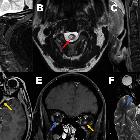Immun-Checkpoint-Inhibitor-Therapie
Immune checkpoint inhibitor therapy is a relatively new treatment for certain cancers which result in immune system-mediated destruction of tumor cells.
Immune checkpoint inhibitors act through a unique mechanism of action when compared with those of conventional chemotherapeutic agents. They target cell surface receptors:
- cytotoxic T-lymphocyte antigen-4
- programmed cell death protein 1
- programmed cell death ligand 1 (PD-L1)
Complications
- immune checkpoint inhibitor therapy-related pneumonitis
- immune-related endocrinopathies
- immune-related hypophysitis
- sarcoid-like lymphadenopathy and granulomatosis
- colitis
- hepatitis
- hyperprogression, an atypical response of paradoxical accelerated growth of tumor
Siehe auch:
und weiter:

 Assoziationen und Differentialdiagnosen zu Immun-Checkpoint-Inhibitor-Therapie:
Assoziationen und Differentialdiagnosen zu Immun-Checkpoint-Inhibitor-Therapie:


